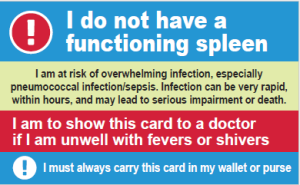Infection
People without a functioning spleen have a lifelong risk of getting a serious bacterial infection. These infections are often caused by bacteria with a tough capsule around the outside (encapsulated bacteria). People without a functioning spleen have a decreased ability to fight these infections.
These can commonly present as infections of the lung (pneumonia), blood (sepsis) or brain (meningitis).
If left untreated some of these infections can lead to an overwhelming post splenectomy infection (OPSI). These are rare but rapidly develop into life-threatening infections in people without a functioning spleen.

Signs & Symptoms of Infection
Common signs and symptoms of infection include:
- Fever over 38 degrees
- Feeling cold
- Shivering and shaking
- Diarrhoea
- Vomiting
- Exhaustion
- Confusion
- Severe headaches
People without a functioning spleen can get very sick very quickly if these symptoms are ignored.
Early diagnosis of an infection can be lifesaving.
If you suspect you have an infection seek urgent medical attention.
If you are unable to seek urgent medical attention, take your emergency supply of antibiotics as prescribed and seek medical attention as soon as possible.
Please click here to read more on antibiotics
Animal bites
Capnocytophaga canimorsus is a bacterium that is often found living harmlessly in the mouths and claws of some animals such as cats and dogs.
These bacteria can be harmful in people without a functioning spleen and can cause a serious infection.
If you get bitten or scratched by an animal:
- Immediately wash the area thoroughly and apply an antiseptic.
- Watch the wound for signs and symptoms of infection (redness, swelling, pain, pus).
Seek urgent medical attention if you suspect wound infection or develop fever, chills, vomiting, diarrhea, headache or confusion.
Spleen Checklist
- Remember the signs and symptoms of an infection
- Ensure you are up to date with your vaccines
- Have the flu shot annually
- Ensure you have an emergency supply of antibiotics
- Take your daily antibiotics (if prescribed)
- Carry your medical alert card or wear a medical alert ID
- Let all doctors know you do not have a spleen
- Seek travel advice 6 – 12 weeks prior to overseas travel

